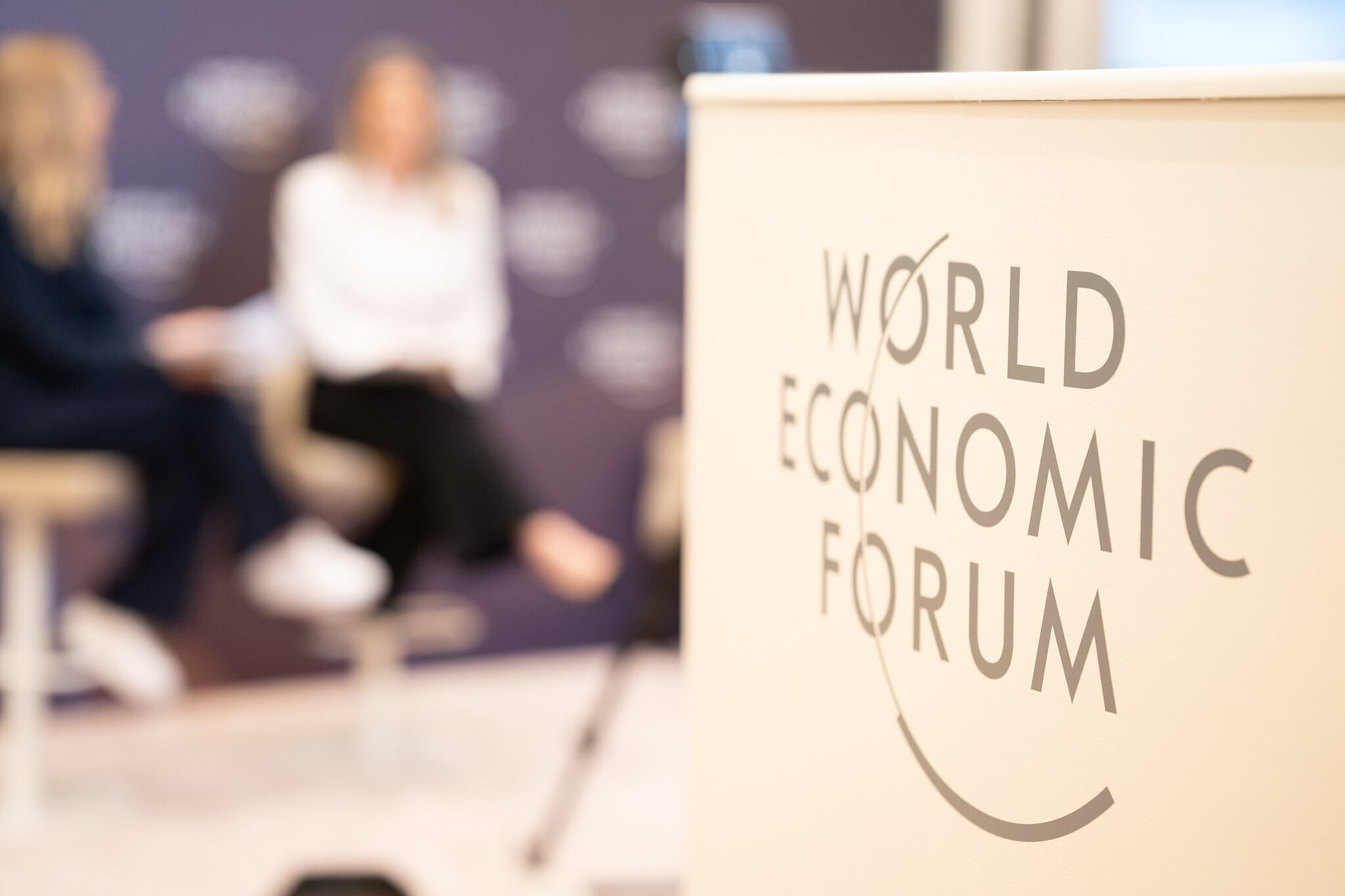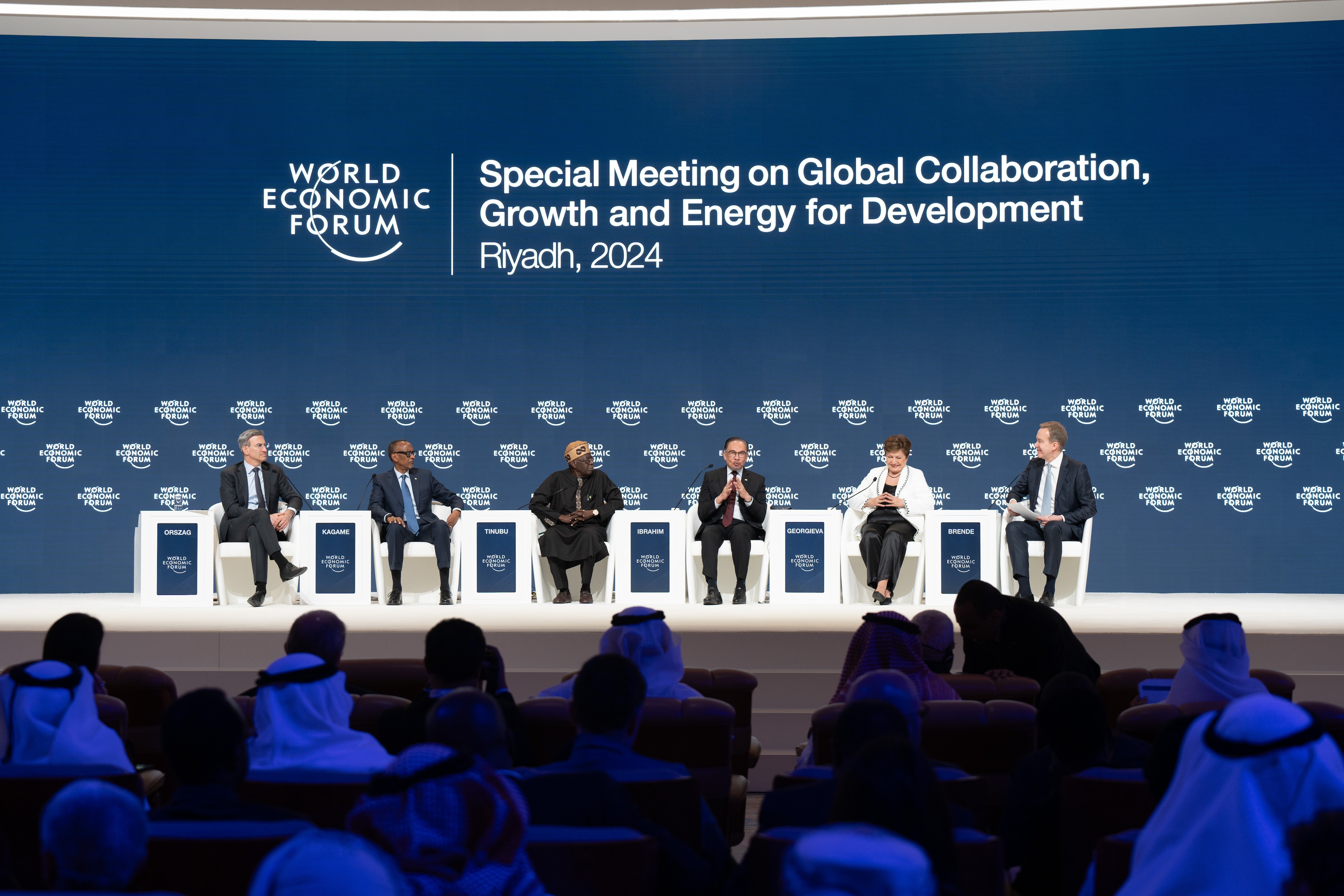These are the women who made the 'SDGs' happen

Paula Caballero has said the concept of the SDGs came to her in early 2011; they've since become a blueprint for global progress. Image: United Nations Information Centre

Get involved with our crowdsourced digital platform to deliver impact at scale
Stay up to date:
Davos Agenda
Listen to the article
- The Sustainable Development Goals are now widely used guideposts for building prosperity and resilience.
- They were hatched and promoted by two women from a ‘developing’ country.
- Scrutiny of the goals at their halfway mark points to a need to hasten progress.
A few years ago, an experiment conducted on thousands of first-year university students found that setting goals generally helped them get better grades. No surprise. But in some cases, tweaking those goals slightly higher resulted not just in a lack of improvement, but in doing even worse than non-goal-setting peers.
That points to an uneasy truth: whether designed to improve academic performance or save the planet, goals are usually helpful but often elusive.
The goals threaded into high-level meetings of experts and decision-makers grappling with global challenges have evolved. The UN’s 8 Millennium Development Goals timed out with mixed results in 2015. Which begged the question, at a point when some problems were becoming even more severe: what now?
The “what now” turned out to be 17 Sustainable Development Goals to be achieved by 2030 – covering everything from eliminating poverty to slashing emissions, and visible on candy-coloured posters and lapel pins seemingly everywhere.
The concept might seem abstract to the bulk of the global population paying more attention to earning a livelihood than the latest climate science or gender-equality statistics. But being able to collectively ask ourselves how we’re doing, and actually having a clear-cut, measurable way to respond, is crucial for everyone.
That only becomes more true over time. Shortly after the “SDGs” were adopted, a World Bank official from Colombia named Paula Caballero pointed out that climate change was already a “massive threat multiplier” making the need to bolster general wellbeing more urgent. Now, the planet has just experienced its hottest three months on record, by a wide margin, and at the midpoint of their existence only an estimated 15% of SDGs are on track.
Caballero understood the logic behind the SDGs better than most people – because she had created them.
Her construct has reframed development priorities around issues that bind everyone together, like rising sea levels or polluted air. That contrasts with the prior approach of simply dividing the world into wealthy countries, and everyone else who presumably needs help catching up.
It's been noted recently that surprisingly few people are aware of Caballero’s triumph in conceiving and establishing the goals, despite daunting political odds.
Last year, she told her alumni magazine that the idea came to her during an early 2011 meeting at Colombia’s Ministry of Foreign Affairs. Nearly five years after that, all 193 countries of the UN General Assembly had adopted an ambitious agenda anchored by the concept.
Coming up with the idea was one thing. Giving it enough political support to have a shot at gaining broad acceptance was another. That’s where Patti Londoño, a Colombian Foreign Affairs Ministry official working closely with Caballero, proved instrumental.
Overcoming a 'patriarchic' mindset
In interviews, Caballero and Londoño have acknowledged the significance of a global development framework coming from a “developing” country, engineered by women. Prior to the adoption of the SDGs, development had mostly been infused with a “very patriarchic mindset,” Caballero has observed.
That mindset made the thrust of the Millennium Development Goals, adopted in 2000, relatively straightforward – rich countries helping less-wealthy countries do things like eradicate hunger and combat disease. And there were some successes; China managed to substantially lower maternal mortality rates, and India sharply reduced poverty.
Resistance to changing the model was to be expected. The notion that all countries need a push in the right direction, regardless of economic status, required a more well-rounded sensibility.
The process of winning acceptance had to start modestly, with an initial presentation of the SDGs in an official UN setting at an event in Indonesia that didn’t include any discussion time. It was in the hallways, Caballero and Londoño have said, that they started to pick up on a building sense of excitement that eventually translated into official support (they detailed their experience in a book published last year).
It’s easy to overlook or underplay the importance of the goals. “Boring” is how the Brookings Institution has boiled down the news media’s assessment of them to date. That hasn’t exactly strengthened coverage of how companies are, or are not, playing a constructive role in their achievement.

And there are even bigger issues to overcome. One is the need to always look well beyond the next few years, to account for changes that take place over lifetimes.
After all, the first model for the modern factory, which helped kick off the Industrial Revolution and all of the environmental damage that came with it, started operating more than 300 years ago. I recently visited the biggest glacier in the Alps, which peaked in size around 1860 – though it wasn’t until hundreds of years later that people began realizing this was evidence of a serious problem.
Long-term anticipation is far more easily prescribed than done. “As human beings,” Caballero said during remarks made in 2015, we’re "not really good at that.”
To maintain focus amid constantly changing leaders, laws, priorities, and global temperatures, people put things down in writing. They set goals to match their needs and expectations. The Code of Hammurabi qualifies. So does the Magna Carta, or the US Constitution – in which, much like for those first-year university students, the occasional upgrading of ambition can result in falling far short.
But that’s no reason to stop trying. The SDGs are proof that we haven’t.
They’re also more evidence that the “shadowy” forces of global governance actually consist mostly of earnest people like Caballero and Londoño, doing what they can to overcome bureaucratic inertia and resistance to change – and sometimes succeeding.
More reading on the SDGs and their significance
For more context, here are links to further reading from the World Economic Forum's Strategic Intelligence platform:
- These scholars outlined four specific ways to address the lack of political impact achieved by the SDGs so far; one involves turning parts of them into binding international law. (Science Daily)
- “Societies were not signing on to cherry-pick goals here and there.” This think tank published a series of essays exploring ways to improve the “second half” performance of the SDGs. (Brookings)
- Zero chance for zero hunger? That could be the case if nothing’s done to fix “dysfunctional food markets” dominated by a handful of major agribusiness firms, according to this piece. (Project Syndicate)
- “More brutal and draconian.” Gender equality has suffered devastating setbacks in Afghanistan during two years of Taliban rule, according to this analysis. (United States Institute of Peace)
- That’s one way to make cities more resilient – according to this study, the type of worker now most likely to commute into a downtown office rather than work from home (creative, with an “outward orientation”) means some urban areas may become even more vibrant than before COVID-19. (CEPR)
- We may not understand life below water as well as we assume. Scientists are baffled by a golden orb recently discovered in the Pacific Ocean, and can’t identify it “beyond the fact that it is biological in origin,” according to this report. (Smithsonian Magazine)
- Life on land can be equally flummoxing. According to this piece, we could see a 36% increase in “alien species” capable of having a catastrophic impact on ecosystems by 2050 – though there’s still time to avoid the worst outcomes. (The Conversation)
On the Strategic Intelligence platform, you can find feeds of expert analysis related to the SDGs, Economic Progress and hundreds of additional topics. You’ll need to register to view.
Don't miss any update on this topic
Create a free account and access your personalized content collection with our latest publications and analyses.
License and Republishing
World Economic Forum articles may be republished in accordance with the Creative Commons Attribution-NonCommercial-NoDerivatives 4.0 International Public License, and in accordance with our Terms of Use.
The views expressed in this article are those of the author alone and not the World Economic Forum.
Related topics:
The Agenda Weekly
A weekly update of the most important issues driving the global agenda
You can unsubscribe at any time using the link in our emails. For more details, review our privacy policy.
More on Forum InstitutionalSee all
Maroun Kairouz
May 3, 2024
Gayle Markovitz
April 28, 2024
Gayle Markovitz
April 27, 2024
Mirek Dušek and Maroun Kairouz
April 27, 2024
Kate Whiting
April 26, 2024
Spencer Feingold and Gayle Markovitz
April 19, 2024








